28 Sep 2022 | News, Russia, United Kingdom
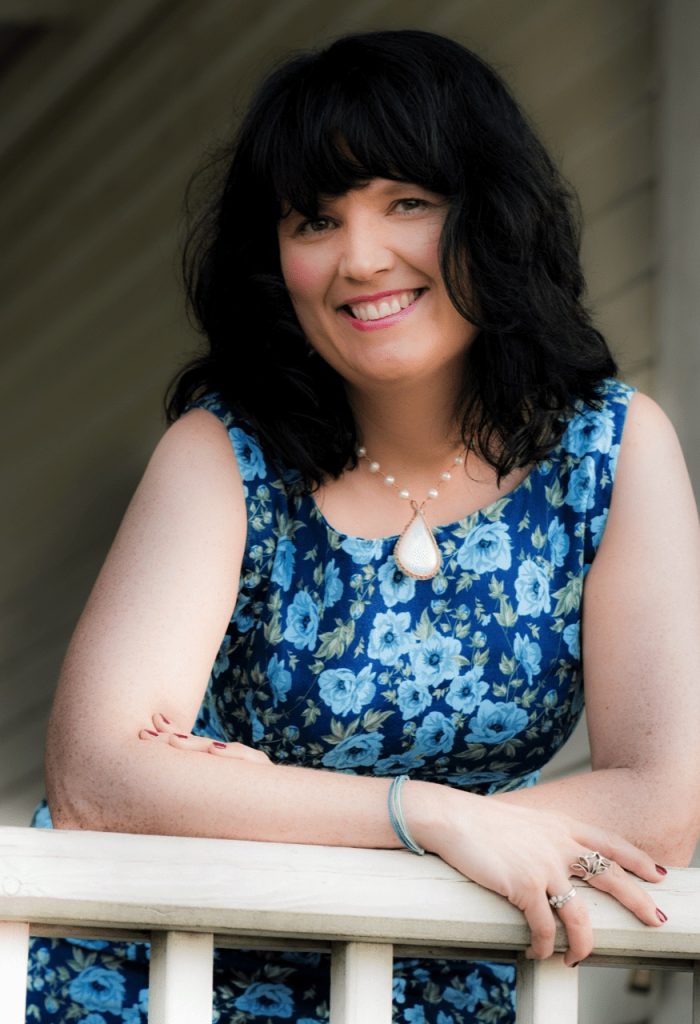
Dr Emma Briant, one of the key researchers who uncovered the Cambridge Analytica scandal in 2018
The vortex of misinformation, conspiracy theories, hatred and lies that we know as the unacceptable face of the internet has been well documented in recent years. Less well documented are the players behind these campaigns. But a small and growing group of journalists and researchers are working on shining a light on their activities. Dr Emma Briant is one of them. The professor, who is currently an associate at the Center for Financial Reporting and Accountability, University of Cambridge, is an internationally recognised expert who has researched information warfare and propaganda for nearly two decades. Her approach is that she doesn’t just research one party in the information war. Instead Briant considers each opponent, even those in democratic states, a breadth and detail that is important. As she tells me you miss half the story if you concentrate on single examples.
“This is a world in which there is an information war going on all sides and you can’t understand it without looking at all sides. There isn’t a binary of evil and pure. In order to understand how we can move forward in more ethical ways we need to understand the challenge that we are facing in our world of other actors who are trying to mislead us,” Briant says.
“There are powerful profit-making industries that are reshaping our world. We need to better research and understand that, to not simply expose some in isolated campaigns like they are just bad apples,” she adds.
Briant is perhaps best known for her work on Cambridge Analytica. She was central in exposing the data scandal related to the firm and Facebook at the time of the USA’s 2016 election. So what drove her to this area of research?
“My PhD looked at the war on terror and how the British and Americans were coordinating and developing their propaganda apparatus and strategies in response to changing media forms and changing warfare. Now that led me to meet Cambridge Analytica or rather its predecessor, the firm SCL group. Cambridge Analytica were using the kind of propaganda that had been used in the military, but in this case in elections, in democratic countries.”
The groundwork for this research was laid much earlier, when Briant lived as a child in Saudi Arabia around the time of the Gulf War. She was shocked to find lines and lines of Western newspapers censored with black pen, to the point you couldn’t read them, and pro-US and anti-Iraq propaganda everywhere.
“I was amazed by the efforts at social control,” she said.
Then, during her first degree, she studied international relations and politics when 9/11 happened and, as she says, “the world changed”.
“I was really very concerned about what we were being fed, about the spin of the Iraq war,” says Briant.
Like many she was inspired by a teacher, in her case Caroline Page.
“[Page] wrote a book on Vietnam and propaganda, and she had interviewed people in the American government and I was amazed that a woman could just go over to America and interview people in politics and in government and get really amazing interviews with high level officials. This really inspired me.”
Briant was motivated by both Page’s example and her specific work.
“She wanted to really find out what was going on and understand the actors behind the propaganda. And that is what really fascinates me most. Who’s behind the lies and the distortions? That’s why I’ve taken the approach that I have, both in looking at power in organisations like governments and how that’s deployed, and looking at how we can govern that power in democracies better.”
Because of Briant’s all-sided approach, she says she can attract the ire of people across the spectrum. People who focus only on Russia, for instance, might dislike that Briant critiques the British government. Conversely, people who are critics of the UK and US government call into question whether she should challenge Russian or Chinese propaganda. But, as she reiterates, “it’s really important to have researchers who are willing to take on that difficult issue of not only understanding a particular actor but understanding the conflict, protecting ordinary people and enabling them to have media they can trust and information online which is not deceptive.”
Criticism of her work has at times taken on a sinister edge. Briant is, sadly, no stranger to threats, trolling and other forms of online harassment.
“It’s very difficult to even just exist online if you’re doing powerful work, without getting trolled,” Briant says.
“The type of work that I do, which isn’t just analysing public media posts and how they spread, but is also looking at specific groups’ responsibilities and basically researching with a journalistic role in my research, that kind of thing tends to attract more harassment than just looking at online observable disinformation spread. Academics doing such work require support.”
Briant cites the case of Carole Cadwalladr, a journalist at the Guardian, as an example of how online campaigns are used to silence people. Like Briant, Cadwalladr pointed the looking glass at those behind the misinformation that spread in the lead-up to the EU referendum. Cadwalladr experienced extreme online harassment, as well as a lengthy and very expensive legal battle. Taken by Arron Banks, the case had all the hallmarks of being a SLAPP, a strategic lawsuit against public participation, namely, a lawsuit that has little to no legal merit. Its purpose is instead to silence the accused through draining them of emotional, physical and financial resources.
Briant has not been the subject of a SLAPP herself but has experienced other attempts to threaten, intimidate and silence her. Meanwhile, the threat of lawfare lingers in the background and has affected her work.
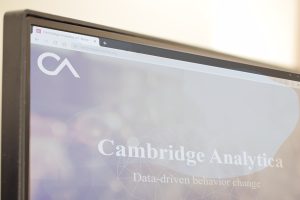 “Legal harassment has a real impact on what you feel like you are able to say. At one point after the Cambridge Analytica scandal it felt like I couldn’t work on highly sensitive work with a degree of privacy without the threat of being hacked or legal threats to obtain data or efforts to silence me. You cannot develop research on powerful actors and corrupt or deceptive activities as a journalist or a researcher without knowing your work is secure,” Briant says.
“Legal harassment has a real impact on what you feel like you are able to say. At one point after the Cambridge Analytica scandal it felt like I couldn’t work on highly sensitive work with a degree of privacy without the threat of being hacked or legal threats to obtain data or efforts to silence me. You cannot develop research on powerful actors and corrupt or deceptive activities as a journalist or a researcher without knowing your work is secure,” Briant says.
The ecosystem might be changing. New legislation has been proposed that will make using SLAPPs harder in the UK, where they are most common (the US, by comparison, has laws in place to limit them). But, as Briant highlights, there is more than one way to skin a cat.
“I don’t think people really understand the silencing effect of threat, not necessarily even receiving a letter but the potential of people to open up your private world. The exposure of journalism activities before an investigation is complete enables people to use partial information to misrepresent the activities, it can even put sources at risk,” she says.
While Briant believes these harassment campaigns can affect anyone doing the sort of work that she and Cadwalladr do, she says we can’t ignore the gender dynamic.
“Trolling and harassment affects a lot of different women and women are much more likely to experience this than men who are doing powerful work challenging people. This is just true. It’s been shown by Julie Posetti and her team, and it’s also the case if you look at other minorities or vulnerable communities.”
Of course if Briant was just a bit player people might not care as much. Instead, Briant has given testimony to the European Parliament and had her work discussed in US Congress. She’s written one book, co-authored another and has contributed to two major documentary films (one being the Oscar-shortlisted Netflix film The Great Hack). In today’s world, the attacks she has received have become part of the price people are paying for successful work. Still it’s an unacceptable price, one that we need to speak about more.
Briant is doing that, as well as more broadly carrying on with her research. She’s also writing her next two books, one of which revisits Cambridge Analytica. In Briant fashion, it places the company in a wider context.
“I’m looking at different organisations and discussing the transformation of the influence industry. This is really a very new phenomenon. Digital influence mercenaries are being deployed in our elections and are shaping our world.”
18 Mar 2022 | 50 years of Index, China, History, Ireland, Magazine, News, Philippines, United Kingdom, United States, Volume 51.01 Spring 2022 Extras
[vc_row][vc_column][vc_column_text]
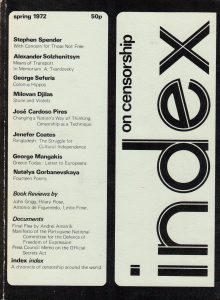
The first issue of Index on Censorship magazine, in March 1972.
You may have heard that the 70s were different. In 1972, when the first issue of Index magazine was launched, no one knew that 20 years later there would be an influential economic bloc called the European Union. The Beatles’ had only just split. The World Trade Center in New York was being built, while Sir Edward Heath was the prime minister of the United Kingdom.
Fifty years on and some things remain. Queen Elizabeth’s reign goes on and celebrates its 70th anniversary in 2022. Dictatorships and censorship, which should be trapped in history books, continue to torment the lives of many. And as a result, Index on Censorship remains vigilant, defending freedom of expression and giving voice to those who are silenced.
As we celebrate our 50th anniversary, we go back in time and remember the remarkable events that happened in 1972.[/vc_column_text][vc_custom_heading text=”1″][vc_column_text]January 30th: British soldiers shoot 26 unarmed civilians during a protest in Derry, Northern Ireland. Fourteen people were killed on this day known as “Bloody Sunday”. [/vc_column_text][vc_custom_heading text=”2″][vc_column_text]February 1st: Paul McCartney and the Wings release “Give Ireland back to the Irish” in the UK. It would be banned by the BBC, nine days later. [/vc_column_text][vc_custom_heading text=”3″][vc_column_text]February 5th: Airlines in the United States begin to inspect passengers and baggage. Tough to imagine that people traveled without any surveillance. [/vc_column_text][vc_custom_heading text=”4″][vc_column_text]February 17th: British Parliament votes to join the European Common Market. In 2020, the United Kingdom would leave the European Union. [/vc_column_text][vc_custom_heading text=”5″][vc_column_text]February 21st: Richard Nixon becomes the first US president to visit China, seeking to establish positive relations in a meeting with Chinese leader Mao Zedong, in Beijing.
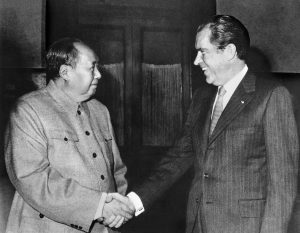
Mao Zedong and Richard Nixon during Nixon’s historical visit to China in 1972. Photo: Ian Dagnall/Alamy
[/vc_column_text][vc_custom_heading text=”6″][vc_column_text]March 15th: The Godfather, starring Marlon Brando and Al Pacino, premieres in New York. It wins Best Picture and Best Actor (Brando) at the 45th Academy Awards.
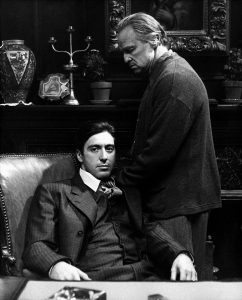
Al Pacino and Marlon Brando in the Godfather. The first film of one the most successful franchises of all time was released in 1972. Photo: All Star Library/Alamy
[/vc_column_text][vc_custom_heading text=”7″][vc_column_text]June 18th: British European Airways Trident crashes after takeoff from Heathrow to Brussels, killing all 118 people on board. [/vc_column_text][vc_custom_heading text=”8″][vc_column_text]July 1st: Feminist magazine Ms, founded by Gloria Steinem, publishes its first issue, with Wonder Woman on the cover.[/vc_column_text][vc_custom_heading text=”9″][vc_column_text]August 4th: Uganda dictator Idi Amin orders the expulsion of 50,000 Asians with British passports.
[/vc_column_text][vc_custom_heading text=”10″][vc_column_text]September 4th and 5th: 11 members of the Israeli Olympic team are murdered by a Palestinian terrorist group in the second week of the 1972 Olympics in Munich.[/vc_column_text][vc_custom_heading text=”11″][vc_column_text]September 21st: Philippines President Ferdinand Marcos declares martial law. In 2022, his son Ferdinand ‘Bongbong’ Marcos is running for president. [/vc_column_text][vc_custom_heading text=”12″][vc_column_text]October 13th: A flight from Uruguay to Chile crashes in the Andes Mountains. Passengers eat the flesh of the deceased to survive. Sixteen people are rescued two months later.[/vc_column_text][vc_custom_heading text=”13″][vc_column_text]November 30th: BBC bans “Hi, Hi, Hi”, by Paul McCartney and The Wings, due to its drug references and suggestive sexual content. [/vc_column_text][vc_custom_heading text=”14″][vc_column_text]December 7th: Apollo 17 is launched and the crew takes the famous “blue marble” photo of the entire Earth.

The earth seen from the Apollo 17 spacecraft. Photo: NASA/Alamy
[/vc_column_text][vc_custom_heading text=”15″][vc_column_text]December 28th: Kim Il-Sung takes over as president of North Korea. He’s the grandfather of the country’s current leader, Kim Jong-un. [/vc_column_text][vc_custom_heading text=”16″][vc_column_text]December 30th: US President Richard Nixon halts bombing of North Vietnam and announces peace talks in Paris, to be held in January 1973. [/vc_column_text][/vc_column][/vc_row]
3 Mar 2022 | News
In the very first edition of Index on Censorship, published 50 years ago almost to the day, we raised the case of Mykhaylo Osadchy, a Ukrainian journalist and poet, who had been arrested for “anti-Soviet agitation and propaganda”. In a secret trial in his hometown of Lviv in September 1972 he was sentenced to seven years in prison and five years of exile.
An extract from The Mote, Osadchy’s lightly fictionalised memoir of a dissident writer, was published in the Autumn 1972 edition of Index. It provides a unique picture of the life of an intellectual in Ukraine under Soviet rule. “I had committed every vile deed that mankind throughout his existence could ever commit,” he writes. “I had never had the slightest suspicion of what a hostile element I was, or how hostile my thoughts had been.”
Cat and Mouse in the Ukraine by Victor Swoboda from 1973 is a lengthy but fascinating study of contemporary writers struggling, and often failing, to stay on the right side of the censor. Swoboda highlights the significance of the unpublished poem To the Kurdish Brother by Vasyl Symonenko, a writer celebrated by the Soviets as a hero of Communism but taken up by dissidents after the posthumous samizdat publication of his critical diaries. The poem tells “the Kurd” to fight chauvinists who “have come to rob you of your name and language”. It continues: “our fiercest enemy, chauvinism, fattens on the blood of harassed peoples”. It is not hard to see who the “Kurd” in the poem was intended to represent. In 1968 Mykola Kots, an agricultural college lecturer, was arrested for circulating 70 copies of the poem in which “the Kurd” had been replaced with “the Ukrainian”. He received the same sentence as Osaschy.
After the fall of the Berlin Wall, Index continued to support writers from Ukraine. As a result, we were the first to publish the work of Ukraine’s most celebrated contemporary writer, Andrei Kurkov, in English. The November 1993 issue contained an excerpt from The Cosmopolitan Anthem, a short story denounced at the 1991 All-Union Writers Conference in Yalta as “anti-Russian”. The story is, if anything, an attack on unthinking nationalism. Its narrator, an American with mixed Polish-Palestinian heritage, finds himself fighting on both sides of the Vietnam War and Afghanistan. The title of the story refers to the soldier’s utopian dreams of creating a unifying anthem to appeal to people’s better nature.
In 1999 we published extracts from Ukraine’s Forbidden Histories, which combined oral histories collected by the British Library with contemporary photographs by Tim Smith. It remains a striking document of the imprint Ukraine’s past atrocities left on the country. The authors pay tribute to the work of the organisation Memorial (now banned by Putin) in documenting the crimes of the Stalin era. The extracts include testimonies of the Babi Yar massacre of the city’s Jewish population, which has only been officially recognised in 1991. A monument to Babi Yar was reported to have been bombed during the recent invasion.
In 2001, Vera Rich, who devoted her life to translating Ukrainian and Belarusian literature, wrote Who is Ukraine? on the tenth anniversary of the country’s independence. Despite her obvious passion for the country (she translated the national poet Taras Shevchenko) it provides a clear-eyed look at the complicated nature of Ukrainian identity. “For a country to survive… a sense of national identity is required. But the question of what that identity should be has by no means been resolved,” she writes.
Finally, no collection of archive articles from Index on Ukraine would be complete without something from Andrei Aliaksandrau, who worked for Index for several years before returning to his native Belarus. He has now been in prison for over a year after being arrested by the Lukashenka regime. His piece, Brave New War from December 2014, reports on the information war being waged in Ukraine. It is a brilliant piece of reporting. “The principles of an information war remain unchanged: you need to de-humanise the enemy. You inspire yourself, your troops and your supporters with a general appeal which says: ‘We are fighting for the right cause – that is why we have the right to kill someone who is evil.’ What has changed is the scale of propaganda and the number of different platforms used to distribute it. In a time of social networks and with the whole world online, there is no need to throw leaflets over enemy lines, instead you hire 1,000 internet trolls.”
Aliaksandrau has been silenced, for now. But we will continue to report on Ukraine in tribute to him and the other courageous dissidents who have inspired the work of Index over the past five decades.
Research by Guilherme Osinski and Sophia Rigby
27 Jul 2021 | Magazine, United States, Vietnam, Volume 50.02 Summer 2021, Volume 50.02 Summer 2021 Extras
[vc_row][vc_column][vc_single_image image=”116892″ img_size=”full” add_caption=”yes”][vc_column_text]
Whistleblower Daniel Ellsberg, whose leaks 50 years ago this summer aimed the spotlight at the US government’s secret escalation of the conflict in Vietnam over the course of five presidential administrations, is clear that such shattering revelations should not happen just once in a generation.
“There should be something of the order of the Pentagon Papers once a year if not more often,” he said.
Ellsberg speaks to me over Zoom from his home in California’s Bay Area shortly after celebrating his 90th birthday. His mind is as sharp as ever and his belief that government wrongdoing should be uncovered is as strong as it was more than five decades ago. His leaking of thousands of pages of critical failings of presidents from John F Kennedy through to Richard Nixon in US involvement in Vietnam – the Pentagon Papers – proved damning, and ultimately led to Tricky Dicky’s impeachment.
Instead of such yearly disclosures of wrongfully withheld information, Ellsberg says it took 39 years before there was a leak of a similar scale – Chelsea Manning’s disclosure of hundreds of thousands of US diplomatic cables and their subsequent publication by Julian Assange on Wikileaks in 2010.
[/vc_column_text][vc_btn title=”Join Daniel Ellsberg at our virtual magazine launch on Tuesday 3 August: Book a free ticket NOW” color=”danger” size=”lg” link=”url:https%3A%2F%2Fwww.eventbrite.co.uk%2Fe%2Fwhistleblowers-the-lifeblood-of-democracy-tickets-164316941395″][vc_column_text]
On US foreign policy
Ellsberg is of the belief that the world needs a new generation of whistleblowers to keep his government in check.
“US foreign policy is largely conducted as a covert, plausibly denied, imperial policy,” he said.
“We deny we are an empire, and we deny the means we use, the means which every empire uses to maintain its hegemony – torture, paramilitary invasion, assassination. This is the standard for everybody who seeks a global influence over countries and gets involved in regime change the way we do.”
But a career as a whistleblower is unlikely to be recommended to young people emerging from education any time soon.
“I have never heard of anyone wanting to be a whistleblower,” said Ellsberg. “People admire it when they see it, but it is a strange career to set out on – and it’s not a career because you generally only get to do it once. Employers believe you won’t tell their dirty secrets no matter how criminal, illegal, wrongful or dangerous your bosses may be.”
He says that people entering the world of work for the first time need to understand what they are signing up for.
“When young people sign agreements [with their employers] under which they will be asked to not reveal any secrets they become privy to in their job they should take into account that they don’t really have a right to keep that promise in all circumstances,” he said. “Circumstances may well arise where it is wrong to keep silent about information that has come to your attention because other lives are at stake, or perhaps the constitution is being violated and it is wrongful to keep that promise.
“It doesn’t occur to you that you could be asked to take part in very wrongful or criminal activities. In your eyes you are not joining the Mafia, yet you make a promise of secrecy like the Mafia without knowing what you are going to be asked to do. This is why you should have your fingers crossed when you make that promise.”
Ellsberg relates being invited to a meeting in Stockholm to give an award to Ingvar Bratt, who had exposed illegal sales by arms dealer Bofors.
“Bratt told me that he was explaining to his young son – who was 10 or so – that he was meeting me and explained what I had done. He said to his son: ‘Wasn’t that a good thing to do?’ His son said very soberly: ‘Oh no. He shouldn’t have done that; you should never break a promise’. That is how we are all brought up.
“Young people should remain open to the idea that you may be called on to risk your job, your career, your relationships with other people by telling the truth even if you have promised not to do that. It is very unusual advice for young people to hear; it will not improve their career prospects, but it will possibly save a lot of lives.”
On what distinguishes whistleblowers
Ellsberg is in regular contact with other whistleblowers – a club with a very exclusive membership.
“Whistleblowers believe themselves to be quite ordinary,” he said. “They don’t think that what they did is particularly unusual. They think what they did was the thing anyone would have done in the circumstances.
“But stepping back from their views, it is very unusual for people to do what they did in those circumstances. In almost every case their colleagues knew what was happening and that [the wrongdoing] should be known, but they did not ask themselves if they should be the one to tell.
“There is something unfortunately quite rare about whistleblowing, and that is not good for the future of our species. It means that when terribly dangerous processes are at work, like wrongful wars or the climate crisis, we can’t count on people to step forward and tell us what we need to know.
“Very few people get beyond the point of saying ‘This should be known’ to the point of saying ‘No one else is going to do it, so I have to do it’. That turns out to be an almost unpredictable reaction. It is a matter of personal responsibility and moral courage.”
Moral courage is a vital attribute of a whistleblower, since being ostracised is a frequent outcome.
“People will do almost anything and go along with anything rather than be expelled from a group that they value,” said Ellsberg.
On Assange and Manning
But being cast out is often the least of the worries of would-be whistleblowers, as the act comes with significant costs.
“Chelsea Manning said she was willing to face life in prison or even death,” said Ellsberg. “[Edward] Snowden said at one point there were things worth dying for and he hadn’t been killed for it yet, but he was at considerable risk of that – and it could still happen.
“The government does everything it can to magnify those costs both for the whistleblower and anyone who might want to imitate her or him. There is the stigma of being called crazy, being called criminal. The government really goes into trying to defame the whistleblower in different ways, and often quite successfully.
“Assange and Snowden have been made into real pariahs. I was called a lot of names at the time and if you are not willing to be called names that are painful but inappropriate and unearned then this is not something you should go into.”
On Reality Winner
Being a whistleblower today is different from how it was 50 years ago. Technology has made it easier to share information but has also made leaks easier to trace.
“Reality Winner’s case is a classic example of the technical possibility of tracing the source. They were able to see who had probably released it. It illustrates that it is easy to get the information out, but it is relatively hard to hide the fact that you were the one who was the source.
Ellsberg says Winner, who leaked classified information about Russian involvement in the 2016 US presidential election, “did what she should have done”.
Should she have been sent to prison? “Absolutely not.”
“There was evidence of Russian involvement [in the election] which the administration was denying. It was important for the public to know that,” he said.
Winner has now been released from prison early thanks to good behaviour but is still prevented from speaking about the case.
Ellsberg believes a pardon for Winner from president Joe Biden looks unlikely, especially as he has not done the same for Julian Assange.
“Biden, or someone under him who was a holdover from the Trump administration, has renewed the appeal to extradite Julian Assange and that is not entirely surprising. Biden called Assange a ‘hi-tech terrorist’ at the time of the releases that he is indicted for in 2010,” he said.
“It goes against the fact that the Obama administration declined to indict Assange on the very good conclusion [that he was] a journalist releasing information to the American public. Biden could have gone along with that. I still have some small hope that he will [pardon him] as he should, but I don’t count on it.”
Ellsberg is convinced that Assange deserves protection for leaking the Manning cables.
“He certainly acted as a journalist, as a publisher specifically – as much as any of the publishers with whom he shared the Chelsea Manning documents. [Assange’s] philosophy of journalists is actually broader than some others and reflects a relatively new digital age philosophy which I don’t entirely share. He believes in almost absolute transparency with the government, but not of private people. Although I think there are secrets that I am in favour of not releasing, that’s not true of the material he is indicted for in 2010.”
I ask Ellsberg whether he would do the same today as he did 50 years ago and he says he wouldn’t be happy sitting around for months waiting for a paper to dare to publish.
“I would still go first to The New York Times, but If I didn’t hear from them I would go elsewhere. If I felt that the Times was holding back, as it seemed to be doing for several months when I was dealing with [then NYT reporter] Neil Sheehan, I would have to gone to another channel such as Wikileaks or the web directly. Of course, that didn’t exist then.”
He says “the chance of being fingered is greater than it was before”, but concurs that he would do it again.
In one sense, he already has, with the publication of The Doomsday Project on US nuclear policy in 2017 that was based on further material he had copied in his time at government- funded military research organisation Rand Corporation in the 1960s.
That makes Ellsberg that very rare thing: a career whistleblower.
Daniel Ellsberg and the Pentagon Papers
Daniel Ellsberg was born in Chicago in 1931. After graduating from Harvard in 1952 with a BA summa cum laude in economics, he studied for a year on a Woodrow Wilson Fellowship at King’s College, Cambridge.
From 1954 to 1957 he served in the US Marine Corps and in 1962 he earned his PhD in economics at Harvard.
Ellsberg joined the Rand Corporation – a policy thinktank offering research and advice to the US armed forces – in 1959 as a strategic analyst. As part of this role he acted as a consultant to the White House and US Defence Department, specialising in problems of the command and control of nuclear weapons and drafting the operational plans for general nuclear war.
In the mid-1960s, he joined the Defence Department for a year as special assistant to assistant secretary of defence John McNaughton, working on the escalation of the war in Vietnam before serving two years with the US State Department in Saigon.
He returned to the Rand Corporation in 1967 where he worked on the top-secret McNamara study, looking at US decision-making in Vietnam between 1945 and 1968.
Ellsberg says the material that became known globally as the Pentagon Papers did not at first appear to be anything special.
“They didn’t look that effective as they ended in 1968. I assumed that the president [Richard Nixon] would say ‘This is old history and doesn’t have anything to do with me’. It was just a fifth president following in the footsteps of four previous presidents,” said Ellsberg.
The 7,000-page report was duplicated on a Xerox photocopier with the help of his Rand colleague Anthony J Russo.
“In those days it was a fairly slow process, copying just one page at a time,” he said. “Keeping it secret wasn’t a problem. In those days, the guards at the Rand Corporation who checked everyone in and out didn’t get to check in your briefcase. It made my heart pound when I went past them the first few times with a briefcase full of top-secret documents.”
If 7,000 pages were not enough, he also copied thousands more pages of documents relating to US nuclear policy, which he revealed in his book The Doomsday Machine, published in 2017.
The decision to leak came after listening to anti-Vietnam War activist Randy Kehler.
“It was seeing someone with whom I could identify who had a career and who was willing to go to prison,” he said. “It made me ask myself ‘What can I do now that I am ready to go to prison?’”
Ellsberg leaked the report in 1971 to The New York Times, The Washington Post and 17 other newspapers but it was the Times which took the plunge after sitting on the explosive material for months. On Sunday 13 June 1971, it published its first excerpts from the report, but its wider circulation was held up for 15 days due to a court order requested by the Nixon administration.
The release of information showed that the USA had illegally expanded the scope of the Vietnam War and that the administration of president Lyndon Johnson had lied to the public and Congress.
In early 1973, Ellsberg surrendered to the authorities and faced eight charges of espionage, six of theft and one of conspiracy which, if convicted, carried a possible sentence of 115 years.
In the event, Ellsberg did not go to jail for even a single year.
After a four-and-a-half month trial, the charges against him were dropped after the presiding judge, William Matthew Byrne Jr, ordered a mistrial over “improper government conduct” in relation to illegal evidence-gathering.
It was revealed during the trial that representatives of the administration had illegally broken into the office of Ellsberg’s psychiatrist and attempted to steal files in order to discredit him. The FBI had also set up illegal wiretaps on the home phone of security consultant Morton Halperin, through which the FBI overheard his conversations with Ellsberg about the papers.
Indirectly, the Pentagon Papers would lead to Nixon’s impeachment. His anger at constant leaks led to the illicit wiretapping and burglaries that ended with his downfall over the Watergate scandal.
[/vc_column_text][vc_btn title=”Join Daniel Ellsberg at our virtual magazine launch on Tuesday 3 August: Book a free ticket NOW” color=”danger” size=”lg” link=”url:https%3A%2F%2Fwww.eventbrite.co.uk%2Fe%2Fwhistleblowers-the-lifeblood-of-democracy-tickets-164316941395″][/vc_column][/vc_row]

 “Legal harassment has a real impact on what you feel like you are able to say. At one point after the Cambridge Analytica scandal it felt like I couldn’t work on highly sensitive work with a degree of privacy without the threat of being hacked or legal threats to obtain data or efforts to silence me. You cannot develop research on powerful actors and corrupt or deceptive activities as a journalist or a researcher without knowing your work is secure,” Briant says.
“Legal harassment has a real impact on what you feel like you are able to say. At one point after the Cambridge Analytica scandal it felt like I couldn’t work on highly sensitive work with a degree of privacy without the threat of being hacked or legal threats to obtain data or efforts to silence me. You cannot develop research on powerful actors and corrupt or deceptive activities as a journalist or a researcher without knowing your work is secure,” Briant says.



